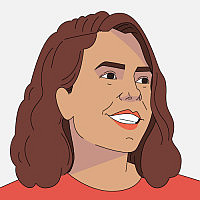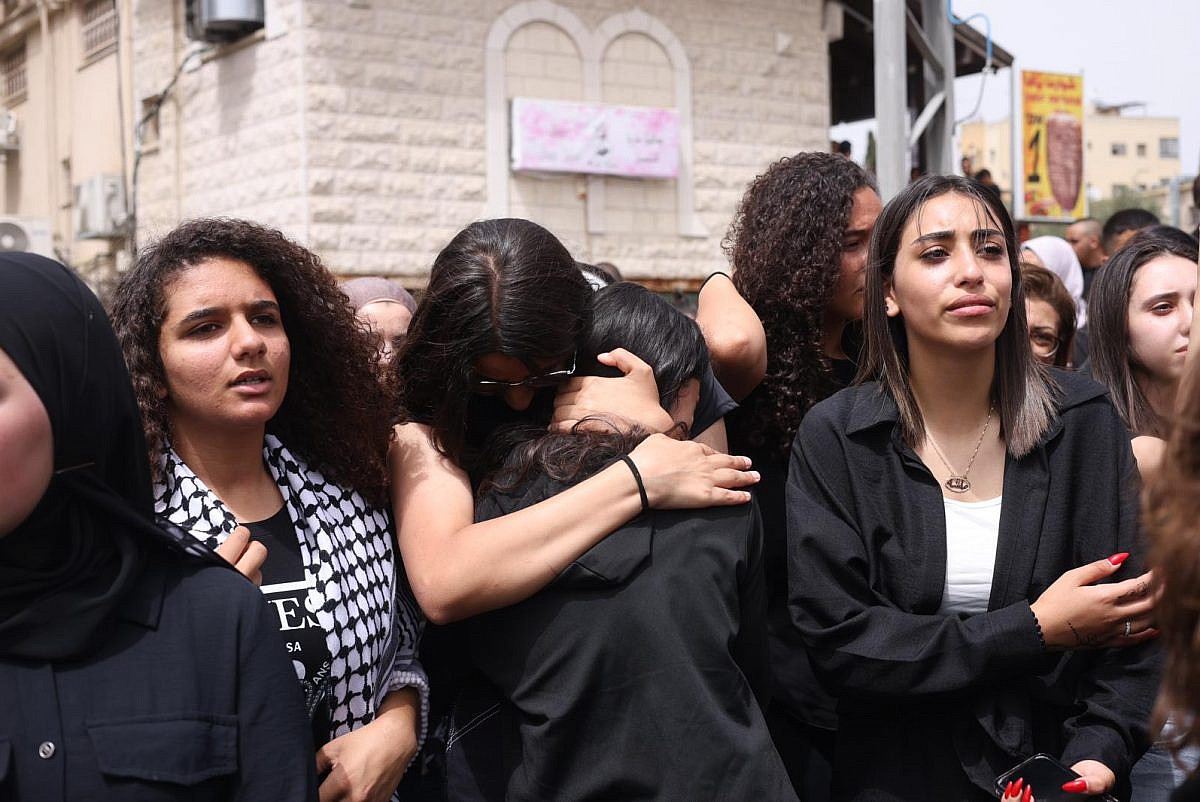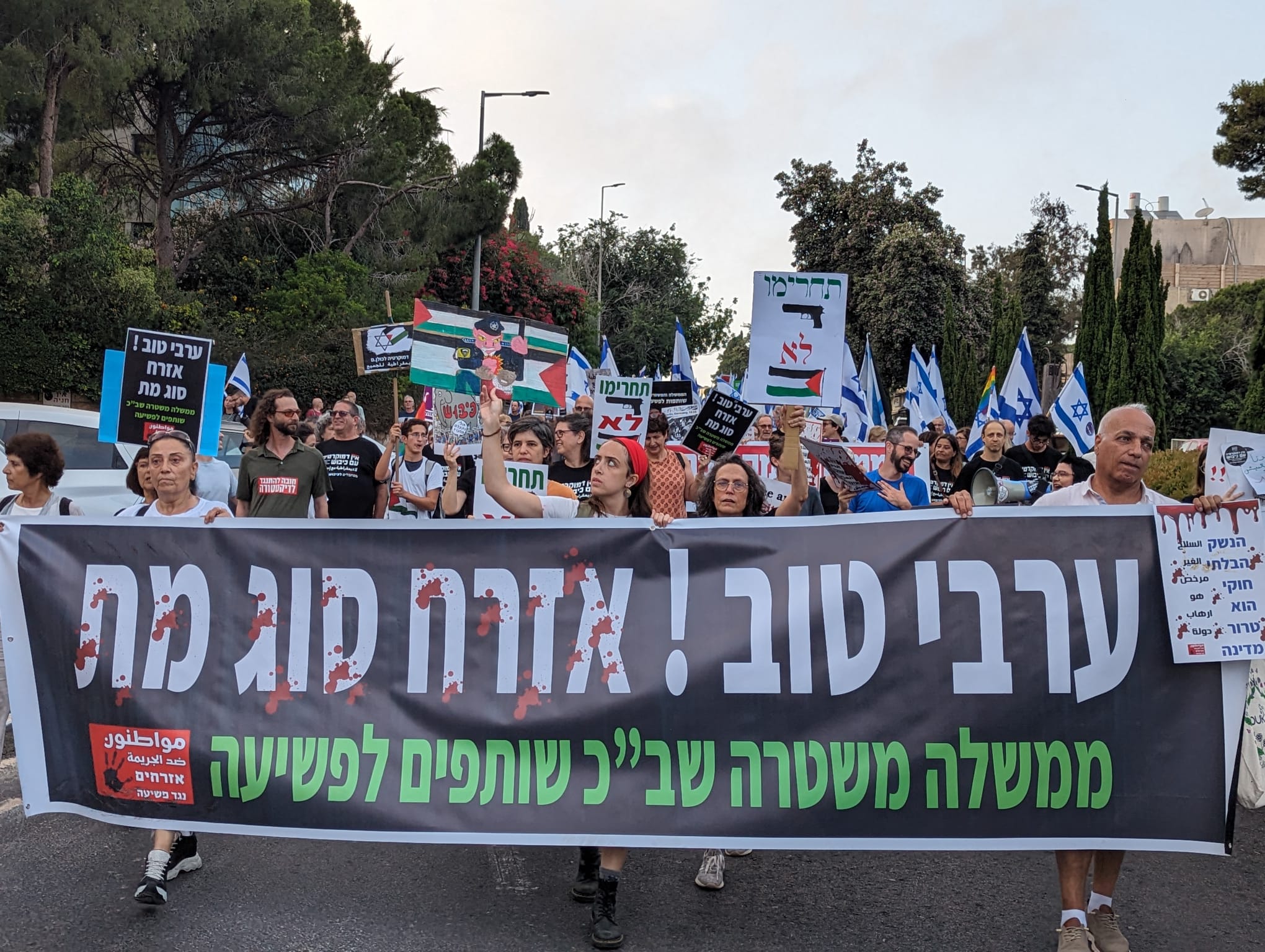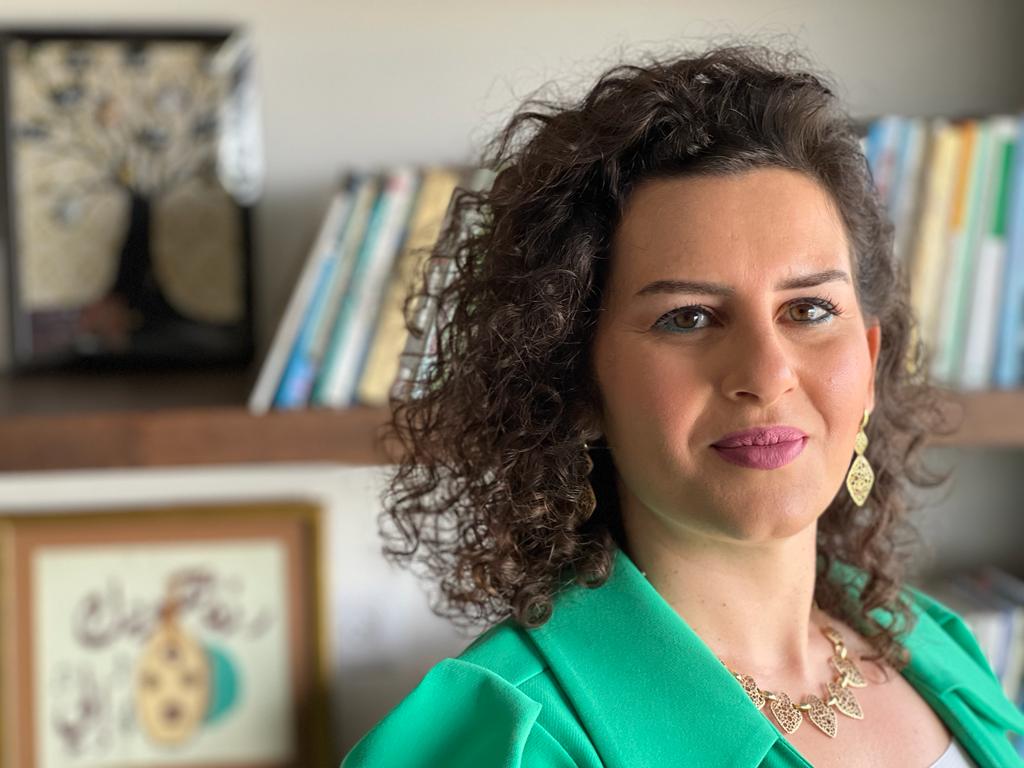Palestinian citizens of Israel witnessed one of the most violent series of crimes in years when, two weeks ago, four men and a minor were shot dead in the northern town of Yafa an-Naseriyye, near Nazareth, as part of a war between local criminal gangs. Although gun violence has become widespread in Arab communities in Israel, this shooting hit especially hard — perhaps because of the large number of fatalities in a single small town, or because it came only a few hours after another shooting in another Nazareth suburb that critically injured a three-year-old girl and a man. Later that same day, another shooting in the city of Umm al-Fahem critically injured a man.
A sense of shared shock and anxiety has since overshadowed Palestinian citizens, a community of nearly two million people who are closely linked by familial, social, and cultural ties. Despite their citizenship, they live under systematic discrimination by the Israeli state — the same state that consistently neglects, and even actively undermines, their safety.
Gun violence and homicides among Palestinians in Israel are far above the national average. The death toll since the beginning of 2023, up until the second week of June, exceeded 100 Arabs including six women and two children; the vast majority were killed with firearms. The numbers show a dramatic increase in victims of homicide over the years. In 2022, there were 116 fatalities in the community; in 2021 there were 126; in 2020, 96; in 2019, 89; and in 2018, 71, according to the Abraham Initiatives. Only 20 percent of the crimes were reportedly solved by the police.
Alarmingly, young people disproportionately make up both the victims and the perpetrators of this violence. Half of the Palestinian victims of gang crimes this year are under the age of 30, according to Arab48. Most “soldiers” of gangs are also between the ages of 15 to 28 years old, and as such are the most exposed to killings, street fighting, and prison time.
Among various factors, the sharp rise in criminality over the past two decades is partly linked to the effects of a policy pursued by the Shabak (Shin Bet), Israel’s internal security agency. In the late 1990s, Israel began “planting” collaborators from the occupied territories, who had worked as informants with the security services, in Palestinian towns and villages inside Israel. Many of these groups were often involved in arms and drug trafficking, thus bringing their criminal activities to the communities and drastically affecting local social and economic dynamics.
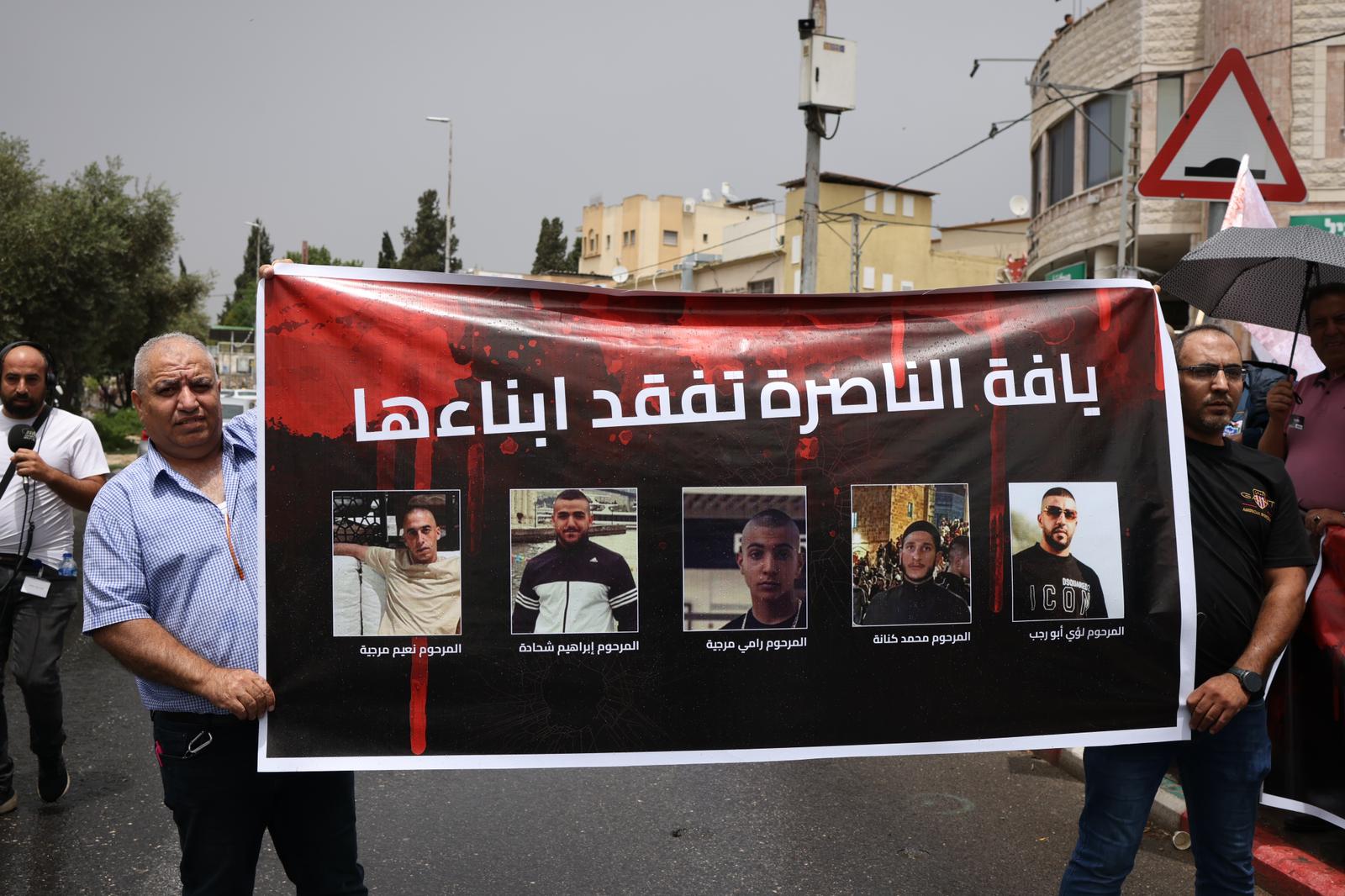
Two years ago, at a high-level meeting addressing the rise of crime, a senior officer in the Israeli police was reported to have made a surprisingly blunt comment, saying that most of the criminals leading the violence in Palestinian towns in Israel were indeed collaborators with the Shabak, and that “the hands of the police are tied” because those informants enjoy immunity. The remarks appear to affirm what is regarded as common knowledge among Palestinians in Israel, and which were also previously vindicated by Israeli state archives showing how such relationships were developed from the time of military rule from 1948 to 1966.
‘They are numb, as if the situation is normal’
Safaa Shehadeh has been a teacher for 20 years. Her city, Baqa al-Gharbiye, has been particularly ridden with violent crimes. Shehadeh, who teaches eighth and ninth grades, sees how her students are deeply affected by the surge of killings.
“They talk about violence and crimes a lot. Their exposure to social media without the supervision of their parents is problematic. Those whose houses were shot at by gunmen, or those who have relatives killed, turn inward and close off. It’s like they live alone in their own world. They lose focus and their grades drop,” she says.
“I don’t feel that they are shocked — they are more numb, as if the situation is normal and life just goes on,” Shehadeh continues. “They react to the news of crimes when they happen, and then pretend that they have forgotten about it. Even when I give them a space to express themselves and share their thoughts, they act as if they are not impacted. They hide it and try to act normal.” Shehadeh notes that she often tries to focus on the stories of victims who are the same age as her pupils, “who were killed without any guilt, a minor who could be anyone of my students.”
The Israeli Education Ministry, Shehadeh adds, has shown little interest in helping educators to address these problems. The government, she points out, asks schools to hold a day or a week of tasamuh (“tolerance” or “forgiveness”), yet will not provide long-term programs with specialists to tackle topics around violence and crime. “After the latest massacre near Nazareth, the ministry sent a letter asking teachers to talk to students about what happened first thing in the morning. But there is no continuous process,” she explains.

Shehadeh emphasizes that there are things that parents and schools can do in the absence of a solid plan from the Education Ministry. Among other activities, she suggests the idea of workshops for “me and my mother” and “me and my father,” because “in this generation, children are isolated from their families and their lives revolve around friends. The aim is to strengthen relations so that the teenager shares with the family every situation that they are exposed to like verbal violence or physical bullying.”
She also suggests that schools “encourage students to participate in organized vigils,” and dedicate more budgets to financially struggling students, “because unfortunately, the one who carries arms is not one who studies and prepares for academic education.” As she sums it up, “Every time we provide them with a supportive environment, psychologically and financially, we will win them over as effective elements of society.”
‘An authoritarian scheme to break our dignity’
Citizens Against Crime is a movement that was established two years ago by Palestinians and Jews in Israel. Salim Abbas, a resident of Nazareth who is one of the movement’s founders, says he wants schools to work on educational programs that combine values like the spirit of giving and volunteering, and that encourage collectiveness more than individual interest. “Even the steps that schools take when they announce a strike in solidarity with tragic events are incomplete, because they are not used to opening a constructive dialogue to educate the students,” he explains.
“As for the parents, fear dominates most families, who then overprotect their children,” he continues. “Some kids go through a bad experience that leads them to slip into a world where there is no future. Other families with a difficult economic situation are barely focused on the teenager’s achievements at school, which leads to the student’s delinquency and recruitment by crime families.”
As such, he argues, “parents and schools must create new frameworks that include students in extracurricular programs that reduce the parents’ anxiety and fear. The ideal school would become a modern model for raising generations dreaming of a successful and safe life.”
Abbas thinks that the failure of schools to tackle the issue is partly due to “unprofessional and thoughtless work, and at times willful carelessness. A remarkable percentage of teachers don’t care about education; they just care about their salary, while most school principals in the Palestinian community don’t get hired except after the approval of the Shin Bet, which still controls appointments within the Education Ministry.”
The exacerbation of violence, Abbas further argues, is part of an “authoritarian scheme” that Israel started implementing after the Second Intifada in late 2000. “When they [Israeli authorities] accuse us that violence is part of our Arab culture, that is wrong,” he stresses. “From 1980 to 2000 — within 20 years — only 83 victims were killed as a result of violence and crime. And from 2000 to 2022 — 22 years — 1,613 victims were killed. The Israeli government admits that there are more than 400,000 unlicensed weapons in the Palestinian community, especially in the hands of criminals, and most of these weapons come from army storages.
“When we look at the increase of victims since October 2000, we conclude that a scheme has been implemented to break the dignity of the Palestinian citizens, who throughout the years defied repression, racism, ethnic cleansing, and forced evacuation. We were forced to leave or live in fear, separated from our struggle for equal civil rights, at a time when the ruling authority realized that the scourge of drugs was not enough to suppress our spirit of struggle, so they added arms to the equation.”
‘We should not leave it to the streets to raise our kids’
Natalie Hayek, from the city of Shefa ‘Amr, is a social worker and drama therapist for students from elementary to middle school. She is also the mother of two children in the first and third grades — both of whom have been particularly shaken by the recent shootings.
“The crime where five people were killed near Nazareth took place just a few meters away from my parents’ house,” she explains. “We [my husband and I] tried as much as possible to hide details of the crime from my kids, but sooner or later they were exposed to it, and they heard about the 15-year-old kid who was killed with a bullet to his head; he was in ninth grade and a classmate of my cousin. My sons heard about the teenager’s killing from my cousins, which caused them huge anxiety. For a few nights they couldn’t sleep, and they kept asking me: ‘Mama, are we going to die soon? Mama, what if I die? What if you die?’”
This heartbreaking experience illustrates how the feeling of insecurity has penetrated every facet of Palestinian family life. “For our kids to develop naturally and healthily, they need to feel safe,” says Hayek. “Violence and crime are all around us; even when you are at home you feel it. There are shootings in all towns and villages, in public places, inside houses, at all times of the day, with no respect for women, children, or the elderly, no respect for holy places, no respect for privacy, or any of the red lines we were used to as a community.”
Hayek emphasizes how, as a therapist working with children, such constant anxiety is extremely hard to treat. “They have trouble sleeping and eating. They suffer from involuntary urination. They are tired, nervous, and refuse to share their emotions,” she explains.
“Parents are also not equipped with the tools to deal with the moment their child is exposed to news of crime and violence. I had seven sessions last week, and in three of them children spoke about bullets targeting their own homes or neighbors’ homes. The shootings were at different times of the day, so there are no ‘rules,’ and parents know they can’t avoid it. Also, as therapists, we do not have all the tools to deal with what is happening. We want to tackle it, but we don’t know where to start.”
Hayek adds that some of the children who go for therapy at the school counselor’s office are actually children from crime families, but therapists can often be afraid to engage because they are not guaranteed safety by the police or the education ministry. “Palestinians inside Israel not only feel that the situation is bad, but they also feel that there is no protection for them,” Hayek said. “The police are supposed to protect us, but they are not doing their job. There’s no hope on the horizon, and the circle of violence is encircling all of us.”
Most read on +972
Asked what parents and school staff could do to begin alleviating the problem, Hayek says: “I think it is very important for parents to be careful about the content that they share with their kids and what they are exposed to on social media. We should also not overshare details [about the news] with them, which is something we can control.
“Secondly,” she continues, “we should create a safe haven. Religious people can use religion, or others can use any kind of belief, that connects us to our oneness with nature or spiritual things. We should go back to the principles that define who we are, how we can act, and what are our boundaries. We should raise our kids right, not leave it to schools or the streets to raise them.”
Despite the overwhelming challenges, Hayek highlights that there is still a great deal of social support among the Palestinian community, noting many local initiatives that have emerged including a support hotline, protests, vigils, lectures, and other public activities. “I still believe in our society, and I haven’t raised my hands and given up. The state is feeding the crimes and not doing its role to protect us, but our community is beautifully displaying solidarity.”

